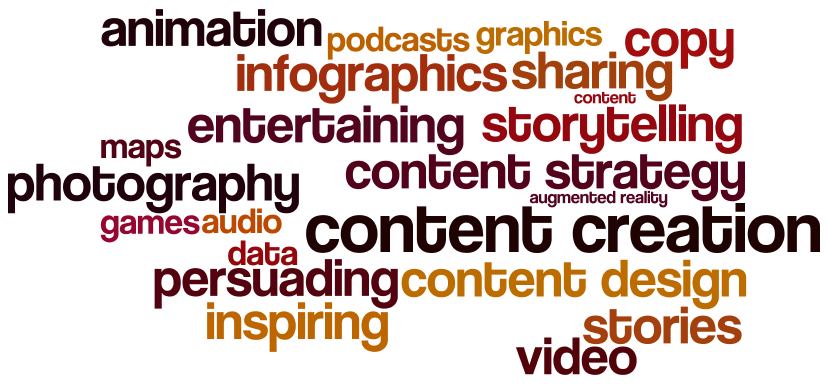 We all know that great digital strategies don’t begin and end with developing a website. But all too often content creation can feel like a burden rather than an opportunity.
We all know that great digital strategies don’t begin and end with developing a website. But all too often content creation can feel like a burden rather than an opportunity.
A recent event at Reading Room offered a chance to hear some inspiring stories about using content, whether that’s video, photography, copy, infographics, games or audio. In each case the organisation faced different challenges and had found that a new approach to content had helped them overcome these.
Real-life problems
Whatever your business, you need content. It doesn’t need to be complicated and it doesn’t need to break the bank. But it does need to be meaningful, interesting, useful and effective.
- Kingspan are a global leader in self-build housing and construction. With over 175 websites they needed a content approach which was consistent, made sense to their customers but reflected the local markets they operate in.
- Catalyst Housing are in the middle of a business-wide digital transformation. Part of this was looking at how to empower staff to use social content to better serve their customers. Moving from “Oh, no, they’re talking to us” to “hi, how can we help”!
- The National Archives wanted to find a way to celebrate the Magna Carta and engage children with this part of history. The resultant award-winning resource used video and game elements to bring the archive materials to life.
So what is the recipe for making the most of digital content?
- Start with a strategy – The basic ingredients need to be agreed from the start and you need to know what you want to achieve. Otherwise you’ll end up with an omelette when you really wanted a soufflé. What is your brand story … and how can digital content help you amplify that message and reach your audience or customers?
- Understand your equipment – Work within your limits and don’t be overly ambitious, but equally don’t be afraid to be inspired. It would be tricky to cater for a dinner party of 20 with just a microwave, but not impossible. In the same way, what’s important is to choose the right kind of content and the right channel, to suit both you and your audience.
- A large spoonful of art direction – There’s no substitute for someone who knows what makes the difference between a good image and a great image.
- Taste, taste, taste – Great chefs taste as they go along. They tweak the flavours and can adjust to their customers’ palates. In the same way, content should be tailored. If you’re commissioning content then you need to work with someone who understands the nuances of your business.
- Share and enjoy – Great-looking food gets shared, whether that’s at the table or on Instagram! Great content gets shared too. If it tells a story, if it evokes an emotion, if it persuades or inspires … your content is a metaphor for the attitude and ideals of your brand.
And finally … to improve, don’t be afraid to ask for help. We all use cookbooks and recipes. Why wouldn’t you get an expert to help you develop your digital content?
Wherever you are in your digital journey, Reading Room can help you. From creating your strategy to producing memorable content; get a taste of how digital content can make you stand out from the crowd.
We’ve recently put our digital content expertise to work for the likes of First Mile recycling, the National Archives and SKODA. Get in touch with our Creative Director, Pete Gomori, to set up an initial consultation.
Reading Room is an award-winning digital consultancy with an international reputation for strategic consultancy, design, and technical delivery. They joined the IDOX Group in 2015.
Share
Related Posts
Supporting residents on the decarbonisation journey: leveraging data for effective retrofit projects
As the drive towards decarbonisation intensifies, the social housing sector’s ability to collect, store and manage vast amounts of data becomes increasingly critical. With a shared goal of creating warmer, carbon-free homes, housing associations’ strategic use of data is essential ....
By Hannah Brunton UNESCO’s Global Media and Information Literacy Week 2022 takes place from 24-31 October 2022 under the theme of “Nurturing Trust”, giving governments, educators, information professionals, and media professionals the chance to discuss and reflect on critical issues ....
In May 2020, Google-affiliated Sidewalk Labs abruptly cancelled its smart city vision for Toronto’s waterfront, citing that “unprecedented economic uncertainty” created by the pandemic had made the project unachievable. Named ‘Quayside’, the venture proposed a 12-acre development of sleek apartments ....
When we last wrote about it in 2019, Mobility-as-a-Service (MaaS) appeared to be on the threshold of transforming the way we get around. An innovative MaaS project had already taken off in Finland, and pilot projects in Sweden and the ....
